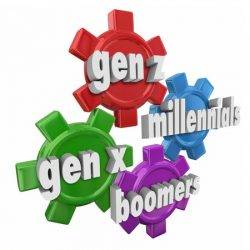October 14, 2016
Stress levels among Gen Y workers higher than other generations 0
Younger workers are more affected by workplace stress than their older colleagues, with half of Generation Y UK workers (50 percent), reporting heightened levels of stress in the workplace, compared to 44 percent for generation X and 35 percent within the baby boomer generation. The Global Benefits Attitudes Survey of 1,895 employees in the UK by Willis Towers Watson suggests that the top causes of workplace stress for Millennials were inadequate staffing and low pay, which mirrored the top two causes across all generations in the survey. This is followed by a lack of work/life balance and unclear and/or conflicting job expectations, whereas for baby boomers it is company culture and excessive organisation change. The report also shows Gen Y workers are more worried about their finances than older workers, with 64 percent of younger workers reporting being worried, compared to 55 percent of generation X workers and 38 percent of baby boomers.
















 New research from AXA suggests that small firms are sceptical about the prospects of technologies such as 3D printing, robotics and driverless cars affecting their workplace in the near future. While more than 40 per cent of small businesses still don’t have a website, the study of 898 firms claims that most of these plan to move online in the next twelve months. If these plans are fulfilled, only seven per cent of UK businesses will remain offline by this time next year. However, just one in five plan to migrate to the Cloud and only six per cent say they expect to adopt smart technologies. Driverless cars, which are set to hit UK roads as early as 2020, have an equally low resonance, as just eight per cent of business owners expect they will travel in one. Businesses were also highly sceptical when it comes to 3D printing. Just two per cent of UK businesses who might use the process expect to see it used here ‘during their lifetimes’.
New research from AXA suggests that small firms are sceptical about the prospects of technologies such as 3D printing, robotics and driverless cars affecting their workplace in the near future. While more than 40 per cent of small businesses still don’t have a website, the study of 898 firms claims that most of these plan to move online in the next twelve months. If these plans are fulfilled, only seven per cent of UK businesses will remain offline by this time next year. However, just one in five plan to migrate to the Cloud and only six per cent say they expect to adopt smart technologies. Driverless cars, which are set to hit UK roads as early as 2020, have an equally low resonance, as just eight per cent of business owners expect they will travel in one. Businesses were also highly sceptical when it comes to 3D printing. Just two per cent of UK businesses who might use the process expect to see it used here ‘during their lifetimes’.


















June 23, 2015
Design must support knowledge circulation in the next generation workplace
by Lee Parsons • Comment, Knowledge, Workplace design
(more…)